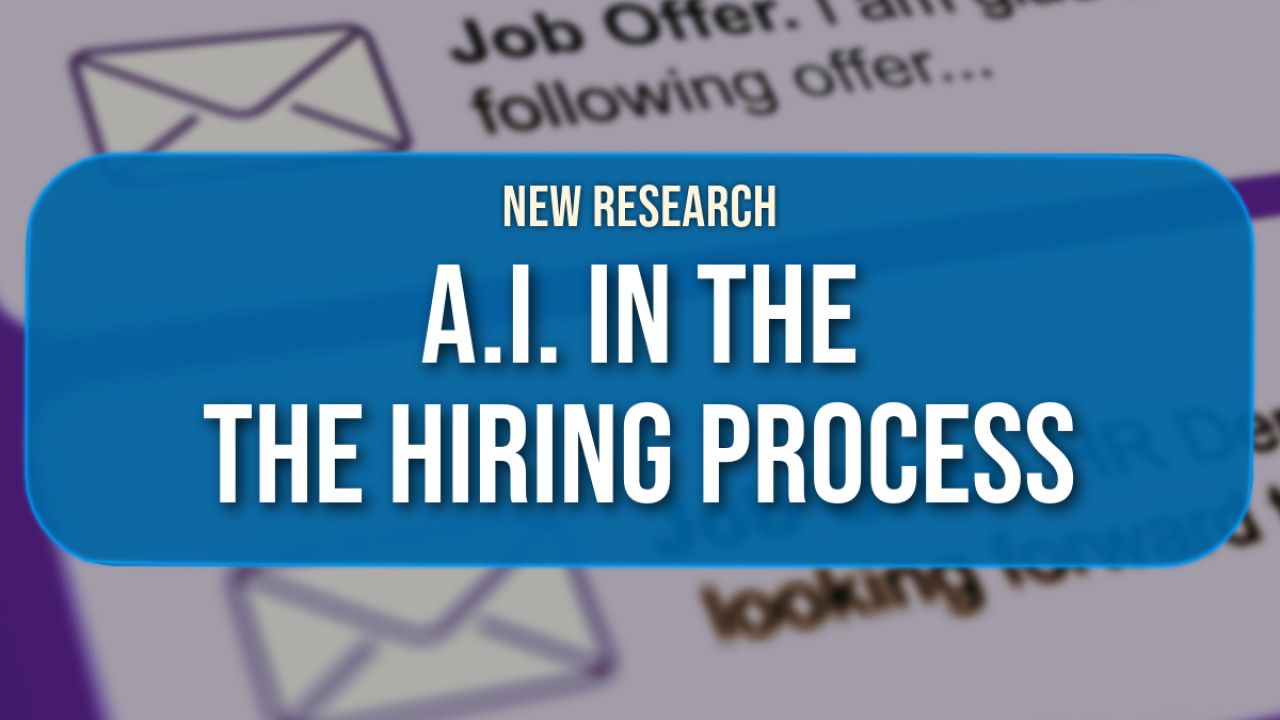May 13, 2025
Communicating with job candidates about the ethical use of AI: How companies can increase candidate trust

In recent years, many companies have begun to use machine learning and artificial intelligence (AI) to recruit employees as those technologies offer benefits, including faster recruitment and saving hiring costs and resources. Given the increasing use of AI in the hiring process, many people are concerned about the capabilities of AI to fairly evaluate their job application materials without unconscious biases.
In 2023, New York City (NYC) implemented new policies to regulate organizations’ AI use in hiring. According to the policies, NYC-based companies are required to have a third-party bias audit to monitor their AI use, and job candidates can request information about companies’ use of AI tools in hiring. Despite the implementation of NYC policies on AI use in hiring, it is largely unknown how the public views the policies and whether following the policies could increase the public’s positive attitudes toward and trust in hiring organizations using AI.
Thus, our project aims to investigate how communicating about ethical AI use in hiring (i.e., having a third-party audit and having AI information available to job candidates) affects individuals’ attitudes and positive word-of-mouth intentions toward hiring companies using AI.
In our Page Center-funded project, published in Computers in Human Behavior: Artificial Humans, we conducted three between-subjects online experiments to test how individuals view job advertisements addressing AI use in hiring with transparency information adopted from NYC’s policies. We created a fictitious company’s job advertisements varying in NYC’s policies on AI use in hiring (having a third-party audit or having AI information available to job candidates) and anticipated outcomes from AI use in hiring (gain: lower unconscious hiring bias or faster hiring process or loss: higher unconscious hiring bias or slower hiring process).
Since participants weren't necessarily aware of NYC’s policies and looking for a job in NYC, two NYC policies were presented as a fictitious hiring company’s voluntary action to be transparent about AI use during hiring. A sample job ad used in our studies is “We use AI tools in hiring processes. Without using AI, candidates will get through the recruitment processes slower. We have a third party audit our AI use to ensure ethical hiring practices.”
The results of three studies indicate that having AI transparency information increases individuals’ favorable company attitudes and trust compared to when no transparency is addressed in job advertisements mentioning AI use in hiring.
However, when we added anticipated outcomes of AI use in hiring (receiving more/less unconscious bias during hiring or faster/slower recruitment time) to job advertisements, we found interesting discrepancies in participants’ responses. When participants viewed job ads addressing faster recruitment as a (positive) outcome of AI use, participants favored having a third-party audit more than sharing AI information with candidates.
When the job advertisements addressed increased or decreased unconscious hiring bias as the result of using or not using AI in hiring, viewing the company’s policy to share AI information with job candidates than having a third-party audit increased participants’ favorable attitudes, trust in the company, and positive word-of-mouth intentions (intentions to positively talk about the company to friends and family).
Based on the findings of this study, we suggest hiring organizations using AI consider the following when communicating about their AI use with job applications:
-
Be transparent about AI use in hiring and inform job applicants about your AI use in the hiring process: Job applicants hold more positive attitudes and trust toward hiring companies who demonstrate their efforts to use AI transparently and ethically.
-
Highlight disadvantages of not using AI rather than promoting advantages of using AI in hiring: Job applicants are more likely to accept the use of AI during hiring and have positive attitudes toward companies when they see the potential negative outcomes from not using AI during hiring (e.g., slow recruitment).
-
Be cautious about your rationale for using AI during hiring: Job applicants are largely skeptical about AI’s capabilities to reduce unconscious hiring bias even when hiring organizations have a third-party audit of their AI use.
-
Make your AI use information available to job applicants: Sharing how AI is used during hiring with job applicants generally leads to positive attitudes and higher trust.
For more information about this study, email Xiong at yxiong@uri.edu. This project was supported by a 2023 Page/Johnson Legacy Scholar Grant from the Arthur W. Page Center.
